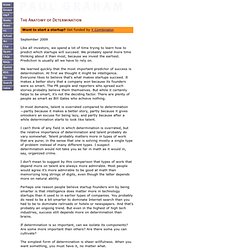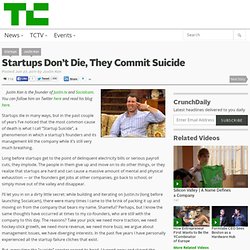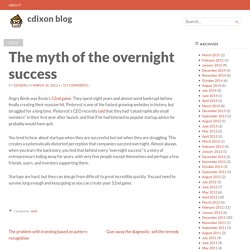

The Anatomy of Determination. September 2009 Like all investors, we spend a lot of time trying to learn how to predict which startups will succeed.

We probably spend more time thinking about it than most, because we invest the earliest. Prediction is usually all we have to rely on. We learned quickly that the most important predictor of success is determination. At first we thought it might be intelligence. In most domains, talent is overrated compared to determination—partly because it makes a better story, partly because it gives onlookers an excuse for being lazy, and partly because after a while determination starts to look like talent. I can't think of any field in which determination is overrated, but the relative importance of determination and talent probably do vary somewhat.
I don't mean to suggest by this comparison that types of work that depend more on talent are always more admirable. If determination is so important, can we isolate its components? Being strong-willed is not enough, however. Notes. Startups Don’t Die, They Commit Suicide. Justin Kan is the founder of Justin.tv and Socialcam.

You can follow him on Twitter here and read his blog here. Startups die in many ways, but in the past couple of years I’ve noticed that the most common cause of death is what I call “Startup Suicide”, a phenomenon in which a startup’s founders and its management kill the company while it’s still very much breathing. Long before startups get to the point of delinquent electricity bills or serious payroll cuts, they implode. The people in them give up and move on to do other things, or they realize that startups are hard and can cause a massive amount of mental and physical exhaustion — or the founders get jobs at other companies, go back to school, or simply move out of the valley and disappear. I’ll let you in on a dirty little secret: while building and iterating on Justin.tv (long before launching Socialcam), there were many times I came to the brink of packing it up and moving on from the company that bears my name.
Solid Rocks & Flowing Rivers. On Twitter last night, Dave Winer pointed back to a prescient* post he wrote in March of last year that includes a reference to the Chinese proverb: “If you sit by the river long enough you will see the body of your enemy float by.”

When I read that proverb last year, my first thought was, “What if your enemy is sitting by the river also? Will it be long enough for them to see your body float by?” Over the years, I’ve observed that many people confuse fads and evolving methods with those things that actually are important in life and work: The never-changing truths related to human nature, trust, respect, relationships and integrity, among others.
Dave and I share a constant amazement (bemusement or dismay might be better terms) whenever people become intoxicated over something they believe is new that we recognize as being built on a foundation that was created and set in motion decades ago, or longer. When we’re in the river, we need a great understanding of the flow. The myth of the overnight success. Tech Angry Birds was Rovio’s 52nd game.

They spent eight years and almost went bankrupt before finally creating their massive hit. Pinterest is one of the fastest growing websites in history, but struggled for a long time. Pinterest’s CEO recently said that they had “catastrophically small numbers” in their first year after launch, and that if he had listened to popular startup advice he probably would have quit. You tend to hear about startups when they are successful but not when they are struggling. Startups are hard, but they can also go from difficult to great incredibly quickly. Insight From Dropbox: Failure Is Not The Worst Outcome, Mediocrity Is.